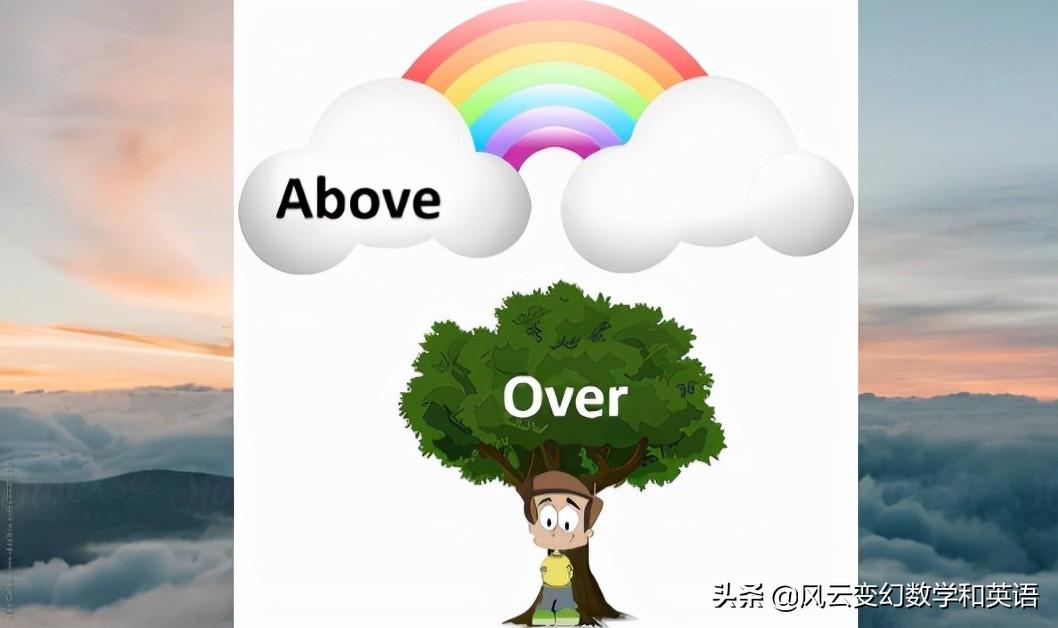above是什么意思(Above 与 over的辨别)
当我们用above作介词时,它的意思是“高于”。它的意思与介词over相近。在下面的句子中,over可以代替above:
The waves came up above her head and she started screaming. (或 … came up over her head …)
She is a nervous flier. But once the plane got above the clouds, she started to relax. (或 … got over the clouds …)

我们用above,而不是over,指的是处于较高或更高层次的事物:
[a ‘chalet’ is a small wooden building usually found in mountainous areas]
Do they live in that chalet above the village?
Not: Do they live in that chalet over the village?
我们通常用above,而不是over,指的是事物之间没有联系的时候。Over或on top of有更普遍的含义,可用于某物触及或覆盖另一物:
They made her comfortable and put a blanket over her.
Not: They made her comfortable and put a blanket above her.
我们通常用over而不是above来表示数字:
I get over sixty emails a day.
Not: I get above sixty emails a day.
If you weigh over 100 kilograms, then you may need to start a diet.
Not: If you weigh above 100 kilograms
警告:
当我们谈论温度与零度或平均值的关系时,我们使用above而不是over:
It was three degrees above zero.
Not: It was three degrees over zero.
当我们在其他上下文中提到温度时,我们通常可以用above或over:
The temperature is already above 30 degrees. (or … over 30 degrees.)
典型错误
我们不用over来表示“更高层次”
Most of the race is 500 metres above sea level.
Not: Most of the race is 500 metres over sea level.
当一个物体接触或覆盖另一个物体时,我们不使用above.
Pour some cream over the tart and serve it warm.
Not: Pour some cream above the tart
- We don’t use above with numbers.
我们不使用above与数字相连
Over 100 people complained about the programme.
Not: Above 100 people complained
- GE空调服务24小时热线-各区售后统一服务实时反馈-今-日-更-新(GE空调变频空调故障代码 ) 07-11
- 阿里斯顿空调售后号码-全国400服务号码实时反馈全+境+到+达(阿里斯顿空调室内机风小 ) 07-11
- 克莱门特中央空调售后维修网点热线查询(克莱门特中央空调空调优势 ) 07-11
- 方米空调24小时售后服务维修点号码实时反馈-今-日-汇-总(方米空调空调热风怎么调 ) 07-11
- 欧威尔中央空调全国各市售后服务点热线号码实时反馈-今-日-更-新(欧威尔中央空调空调温度显示 ) 07-11
- 夏立空调售后服务热线号码-全国各售后号码实时反馈-今-日-汇-总(夏立空调空调柜机e1 ) 07-11
- 富士通中央空调全国维修服务号码实时反馈-今-日-汇-总(富士通中央空调空调显示e6 ) 07-11
- 日立空调售后号码-全国400服务号码实时反馈-今-日-更-新(日立空调空调标志图解 ) 07-11
- 1 金牛座女生性格特点 ——温柔、力量、智慧、耐心 04-27
- 2 离太阳系最远的行星是哪个(太阳系八大行星之最) 08-15
- 3 中国所有省份的简称(各省市名称的由来) 09-05
- 4 余罪结局是什么小说结局揭秘 09-29
- 5 dnf哈林首饰哪套好(DNF手游,首饰推荐,套装不如散搭) 11-07
- 6 揭阳潮汕国际机场,广东第四大机场 12-06
- 7 上海摩托车驾照怎么考 01-04
- 8 拍拍贷钱怎么没到账 01-04
- 9 买房子五证怎么查询 01-04
- 10 摩托套牌抓到怎么处理 01-04

